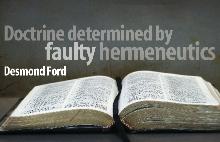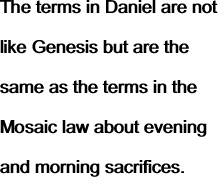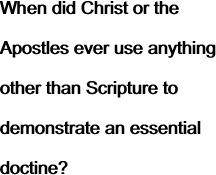 |
|
HOME | PROCLAMATION! MAGAZINE | DEVOTIONALS | STUDIES | LETTERS | ABOUT US | RELATED WEBSITES |
|
HOME / PROCLAMATION! MAGAZINE / 2008 / JANUARY/FEBRUARY / FORD
In 1980 Dr. Desmond Ford made Adventist headlines when he presented his research on the subject of the investigative judgment before a group of Adventist leaders and scholars at Glacier View, Colorado. He demonstrated that this central Adventist doctrine was based on an incorrect interpretation of Daniel 8:14, and it cannot withstand the scrutiny of Scripture and the meanings of the original Hebrew words. As a result of Ford's presentation, he was removed from the Adventist ministry, and in the following months many Adventist pastors and teachers of theology who sympathized with Ford's findings also lost their jobs. Today the church still endorses the original doctrine, but it tolerates a variety of creative interpretations and applications of it.
JANUARY / FEBRUARY 2008
VOLUME 9, ISSUE 1
A R T I C L E S
Doctrine determined by faulty hermeneutics
Desmond Ford
The great embarrassment for Adventists for over 160 years is that the investigative judgment doctrine is an inverted pyramid pivoting on one text—Daniel 8:14. Yet seven times Scripture tells us that in the mouth of two or three witnesses every word must be established.
Of course, it must be admitted that William Miller had fifteen "proofs" for arriving at his date of1844, but the Adventist church never prints 14 of those as they would make the situation even more embarrassing. No one today accepts them because they are ludicrous. This is not a poke at Miller; nobody is good at everything, and for Miller—math was just not his strong point. His other key weakness was exegesis. Not knowing the original languages of the Bible made it difficult for him to check his hunches.
Kai Arasola in The End of Historicism lists all of Miller's 15 routes to 18441 but without enthusiasm. He indicates that nobody today accepts 14 of them, and scholars in general reject all 15.
The one Miller argument the church retains deals with Daniel 8:14, and it defies the original Hebrew which speaks about, not days, but evening-mornings. Miller said the terms were connected to Genesis 1 where the evenings and the mornings marked each day of creation, but the Hebrew in Genesis 1 is different from the Hebrew terms in Daniel 8:14. The terms in Daniel are not like Genesis but are the same as the terms in the Mosaic law about evening and morning sacrifices. One earnest Seventh-day Adventist over 20 years ago wrote key theologians in the top seminaries and universities of USA, trying to persuade them of the typical Adventist understanding of Daniel 8:14. Most of the theologians stressed the point in their replies that 'days' are not in the Hebrew of Daniel 8:14. Let me quote one response:
Dear Mr. Lynch, You have been misinformed "that the only correct translation of Dan 8:14 is 'until 2,300 days.' " The Hebrew phrase can only mean 'For 2,300 evenings and mornings,' which equals 1,150 days. I know of no one who translates the phrase 2,300 days. Genesis 1 is not relevant to this phrase…. the reference is to the 1,150 evening and 1,150 morning sacrifices…. (Alexander A. Di Lella, O.F.M., The Catholic University of America, Washington D.C. Dept. of Biblical Studies).
Scholars from Yale, Harvard, Princeton, Chicago Theological Seminary, Andover Newton Theological School, and Johns Hopkins University replied to Brian Lynch similarly. I have the letters before me as I write.
"Year-day principle" and defilement
To make the situation more difficult still, the word 'weeks' is not in the original Hebrew of Daniel 9:24. The Hebrew word is a plural masculine, which is never used for the seven-day week. (See the New International Version.) The term just means a heptad—a seven of something, just as 'dozen' means 12 of something, and 'score' means 20 of something. The Seventh-day Adventist Bible Commentary (SDABC) in its revised edition stressed that there is no year-day principle here.
But back to Daniel 8:14. Not only are 'days' missing from the Hebrew text but also 'cleansed' is missing, as most modern translations make clear. The actual Hebrew term here means 'vindicate' or 'justify' and is never found in Leviticus 16 in connection with the Day of Atonement ritual.
The embarrassment increases even more when we take into account the context which describes a nasty little horn—not the sins of God's people—defiling the sanctuary. It is therefore the defilement of the little horn—Antichrist—that demands vindication for the holy temple. This little horn (Antichrist) is also in view in Daniel 7 where the text says that the judgment shall sit and 'take away his dominion'. (See Daniel 7:26.)
The SDA Bible Dictionary in its article on the 'little horn' stresses this very point. It's not the sins of the saints that are to be cleansed away, but the wickedness of the little horn is to be rectified and the sanctuary restored or vindicated.
One very important point almost always overlooked by Seventh-day Adventists is that the next chapter interprets the symbolism of Daniel 8:14 by the plain language of 9:24. This later verse and its associated verses complete Gabriel's explanation of the symbols of the vision of chapter 8 and clarify that Daniel 8:14 is not referring to literal days, nor is there any year-for-a-day principle in view. Similarly, the next prophetic chain sheds further light upon the true meaning of Daniel 8, so that in Daniel 12:1-3 we have an enlargement of 9:24 again, using the key word 'righteousness'.
We rightly protest when the Jehovah's Witnesses or the Mormons ignore the context of a verse of Scripture. But to be honest should we not look within before we look without? Both these cults come up with all kinds of doctrinal monstrosities by misusing isolated Scripture verses, and their critics have joyfully or sadly (depending on the critic) pointed this out.
Hermeneutics are key
The fact that individuals and groups interpret the Bible so differently is not the fault of the Scriptures, but the fault of the hermeneutic being employed in each case. Are there some clear rules which can give us a safe hermeneutic and lead to the discovery of truth rather than error? I believe there are such.
1. Essential truth is never esoteric—it is plain and simple. Jesus warned against the multiplying of words, for "in the abundance of words there lacketh not sin" (Proverbs 10:19). He said: "Simply let your 'Yes' be 'Yes,' and your 'No,' 'No'; anything beyond this comes from the evil one" (Matthew 5:37).
Even in Old Testament times God promised that neither a wayfaring man nor a fool need err in determining the truth (Isaiah 35:8). Christ admonished Peter to feed the lambs of the flock. Truth is of such a nature that it is relished by 'lambs' and nourishes them. Even children understood Jesus. It has often been drawn to our attention that the things that trouble us are not the things in the Bible which we cannot understand, but the things we understand only too well but fail to follow; for example, "Thou shalt love thy neighbor as thyself."
2. Essential truth glorifies Jesus and centers in him. See 2 Timothy 3:15 and John 20:31. Salvation is "through faith in Christ Jesus." Concerning the Scriptures, Jesus said, "they are they which testify of me" (John 5:39). Paul was determined to know nothing "except Jesus Christ and him crucified." "Jews demand miraculous signs and Greeks look for wisdom, but we preach Christ crucified…." (1 Cor 2:2; 1:22,23).
Our Lord himself admonished his disciples to look no further than himself for what they sought, "I am the way and the truth and the life. No one comes to the Father except through me" (John 14:6).
Saving truth glories in the incarnation, the sinless life, atoning death, and the glorious resurrection and ascension of our Lord as well as in His priestly ministry, His second advent, and His final judgment of all men. All of these things are clear and explicit in the New Testament. No one need doubt them, and none need dispute them in their essence.
3. Essential truth never rests upon a single verse. Some have said that the Trinity has little to support it in Scripture, but any who study the array of New Testament passages offered by such scholars as Bickersteth (The Trinity) will find this not to be the case. Every fundamental truth of Scripture is oft repeated. The God who multiplied dreams to Joseph and to Daniel, repeating to each in several ways the same truths, has ever behaved thus with his church. Thus we have four Gospels setting forth the life and atoning death of our Lord.
The fact that we are saved through faith in Christ's sacrifice and that such faith always produces holy works is stated over and over in the New Testament. Who that reads Scripture can doubt that faith, hope, and love characterize all true followers of the Lamb of God? Are not even the secondary duties of baptism and participation in the Lord's Supper clearly and repeatedly mentioned? No vital truth rests upon a single passage of Scripture. When some wish to use l Corinthians 15:29 to establish proxy baptism, or Daniel 8:14 to prove the theological significance of a date in our Western calendars, or the parabolic illustration of Luke 17:34 to prove the secret rapture, we have every right to courteously differ.
4. Saving truth, essential truth, is found in Scripture alone. Those who wish to turn a doctrine based in Daniel 8:14 or other isolated texts into a test of fellowship are forced to go beyond Scripture, and even then to no avail. They may invoke Ptolemy's Canon, the Elephantine papyri, and other extra-biblical materials to bolster their case, but thereby they automatically destroy it. When did Christ or the Apostles ever use anything other than Scripture to demonstrate an essential doctrine?
This is the weakness of any interpretation of prophecy that is purely of the historicist school. When one surveys the multitude of varying interpretations of apocalyptic passages found in the writing of historicists, one might well despair of finding truth. But the error lies in the method. While historicists have done well to remind the church that prophecy is ever pertinent to the pilgrimage of the believers in every age, it strayed when it forgot that Scripture was initially addressed to the needs of its first recipients and applies to later ages by way of principle rather than in connection with dates and places. To try to interpret the book of Revelation by using the history of the unbeliever Edward Gibbon or the records of the French Revolution and other European upheavals is to depart drastically from the method of Christ and the Apostles.
The Christian creed should revolve around the centrality of the greatest verse in the Bible—John 3:16. It should major in the Christ event, particularly his atonement on the cross. It will stress salvation by faith alone, yet pointing out that true faith is never alone, for though sanctification is distinct from justification, it is never separate.
The true creed will make central, not the minutiae of "mint, anise, and cumin", but the weightier matters of the law, "righteousness, mercy, faith". When Paul said: "Now these three remain: faith, hope and love," he was merely explicating John 3:16 which speaks of all three—God so loved, that whosoever believeth, may have everlasting life. Other truths implicit in the same key verse include the plurality of the Godhead (the Trinity of the God who gave, God the Son who died, and God the Spirit who creates faith through the Word he inspired), life only in Christ, Judgment, the Second Advent, and the new earth (when we will realize fully our eternal life.)
Because Scripture and only Scripture gives the right view of all these things, the Christian creed will set forth the Bible as the only rule of faith and practice. Because of the 'whosoever' in John 3:16 the priesthood of all believers must also be affirmed. And because the giving of God's only Son was the solution for sin, moral absolutes must be upheld as the fruit of living by the power of the Spirit (see Romans 8) who always points us to the Lamb of God. While Calvary will be shown as leading to Pentecost, the same creed will emphasize that Pentecost always leads back to Calvary.
Inevitable controversy
These four principles should guide all hermeneutics and every group professing Christ. But doing so will lead to inevitable controversy as it did for Paul. A well-known public relations consultant Rene Alexenko Evans wrote an unusual article for The Adventist Review some years ago entitled 'If the Truth Be Told'. It recorded the struggles of one believer to find the truth from her own church—Adventism. We quote:
I'm an Internet junkie with a reporter's curiosity, so I headed for my computer. What popped up on my screen shocked a good girl like me who was raised in a spotless-on-Friday-night, memory-verse-learned-every-week, Seventh-day Adventist home. Not even my degree from an Adventist university prepared me for the frontal assault on what I had always held as truth…. so I started asking questions on an official church Internet forum.
Within a week my messages had been deleted, and I had been locked out…. the pursuit of truth can be an unpleasant business…. As Seventh-day Adventists we pride ourselves on having it and preaching it. Problem is, we don't always want to tell it….
'A lie,' said Winston Churchill, 'gets halfway around the world before the truth has a chance to get its pants on.' But that was before the Internet and instantaneous global communication. Today truth has a fighting chance—provided, of course, we actually want it told.2
We congratulate Ms. Evans for her courageous article, and we also congratulate the editors of the Review for printing it. Perhaps they sympathized.
Most of what has here been written is "old hat". But did not Jesus say, "It is not for you to know the times or dates…." (Acts 1:7)? All we need to know is recorded in Scripture. We must live by Jesus' words: "Now that you know these things, you will be blessed if you do them" (John 13:17). †
Endnotes
- Also printed in Ratzlaff, Dale, Cultic Doctrine, p. 51-81.
- Adventist Review, Evans, Rene Alexenko,"If the truth be told", July 29, 1999, p.48-49, 51-54
![]()
Copyright 2008 Life Assurance Ministries, Inc., Glendale, Arizona, USA. All rights reserved. Revised September 24, 2008. Contact email: proclamation@gmail.com




 Dr. Desmond Ford (Phd Michigan State, USA) (Phd Manchester, England) is the author of over 20 books on subjects ranging from theology to health and lifestyle. After many years teaching theology, culminating at the Glacier View meeting, Dr. Ford founded Good News Unlimited, giving seminars internationally. He returned to Australia in 2000 with his wife Gillian. Des speaks regularly in Brisbane and Sydney at various churches and non-denominational organizations. He has three adult children. Des and Gillian are sabbatarians.
Dr. Desmond Ford (Phd Michigan State, USA) (Phd Manchester, England) is the author of over 20 books on subjects ranging from theology to health and lifestyle. After many years teaching theology, culminating at the Glacier View meeting, Dr. Ford founded Good News Unlimited, giving seminars internationally. He returned to Australia in 2000 with his wife Gillian. Des speaks regularly in Brisbane and Sydney at various churches and non-denominational organizations. He has three adult children. Des and Gillian are sabbatarians.